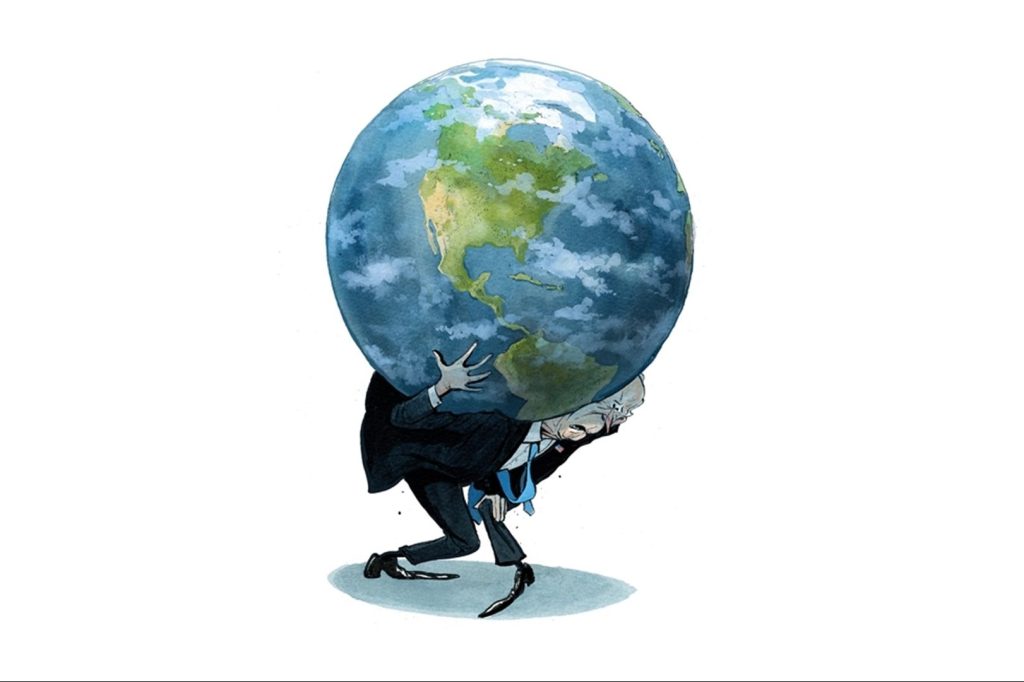Joe Biden prides himself on his decades of foreign policy experience, his ability to talk tough yet be kind, and his talent for bringing opposing sides together. Touching down in Israel this week, he gave Bibi Netanyahu a big hug — quite the gesture — and promptly told him he believed that “the other team” — i.e. Hamas, not Israel — was responsible for the bomb that struck a hospital in Gaza on Tuesday, killing many of non-combatant Palestinians and inspiring another wave of anti-Israel protests. Biden will now set about trying to help release the hostages held by Hamas and persuading local powers to allow a secure flow of humanitarian aid into Gaza.
Israel will be grateful for Biden’s show of support. The trouble is, the president’s standing among Israel’s neighbors is increasingly low. On Wednesday night, as Biden climbed up the steps of Air Force One, the Kingdom of Jordan announced that, following the hospital bombing, it would be canceling the emergency meeting between its ruler, Abdullah II, America’s commander-in-chief, the Palestinian leader Mahmoud Abbas and Egypt’s president Abdel Fattah al-Sisi.
Those Muslim leaders are in no mood for moral lectures from America, it seems. Ahead of Biden’s trip, too, the US secretary of state Antony Blinken jetted out to the Middle East, only to be rudely stood up by the Crown Prince of Saudi Arabia, Mohammed Bin Salman, aka MbS. He was eventually seen the next day, then lectured about Israeli aggression against Muslims. Blinken reportedly received a similarly stern talking to by Egypt’s al-Sisi.
America’s ruling class is not used to being treated in this way. But Biden’s problem is that nobody takes him all that seriously, even if America’s military strength remains unparalleled.
Partly it’s the hypocrisy. As a presidential candidate, Biden denounced Saudi Arabia as a “pariah” following the killing of the Washington Post contributor Jamal Khashoggi. Once in power, however, and especially after global energy supplies were squeezed thanks to the war in Ukraine, he realized he could ill-afford to alienate the Crown Prince. The White House did a spectacular reverse-ferret and defaulted to the usual US position on Saudi Arabia: one of awkward friendship, lubricated by vast quantities of oil. But MbS doesn’t appear to have forgotten Joe’s initial hostility.
Large parts of the Muslim world, Sunni and Shia, appear to have rediscovered their unitive love of Israel hatred
Team Biden, many of whom served under Barack Obama, also grudgingly had to accept a certain logic behind the previous US administration’s approach to the region. Donald Trump tore up the Team Obama’s cherished nuclear deal with Iran, the Joint Comprehensive Plan of Action and essentially delegated Middle Eastern policy to his son-in-law Jared Kushner. A modern orthodox Jew with strong Israeli links, Kushner worked closely with Israel to harmonize relations between Jerusalem and the Sunni gulf states and further diminish Shia Iran’s influence. Even after Trump left the White House, this process appeared to be heading towards its ultimate goal, the “normalization” of Saudi-Israeli relations. Then came October 7, Hamas had their brutal say, and now the Israel-Gulf détente appears to be unraveling.
Biden’s White House also had to accept that Trump had successfully killed off the JCPOA. It did, however, want to pursue the Obama-era approach of easing relations with Iran. This jarred somewhat with the ongoing effort to bring Israel and Saudi Arabia together as a bulwark against Tehran. Last month, America struck a deal to unfreeze $6 billion of Iran’s money in exchange for some released prisoners. Whether that agreement served as some kind of screen or prompt for Hamas’s attack the weekend before last, and the extent to which Iran is behind Hamas’s actions, is a matter of debate in intelligence circles.
What’s certain is that now Iran is now threatening Israel over its revenge assault on Gaza, and large parts of the Muslim world, Sunni and Shia, appear to have rediscovered their unitive love of Israel hatred. After years of exhausting efforts, America’s Middle Eastern diplomacy now appears wrecked. Biden is failing to contain Iranian hostility and appears to have alienated the Gulf states, too. The “war on terror” is rekindled. America has reverted to the George W. Bush-era approach towards containing Iran: sending aircraft carriers to the Gulf (Trump did it, too) and warning Iran that any military actions or major attacks by Iran-sponsored Hezbollah will be met with a fierce US-led response. Historically, such threats have proved effective. Today, however, with the Arab world seeming to grow in its contempt for American diplomacy, Iran may feel less constrained.
This article was originally published on The Spectator’s UK website.

























